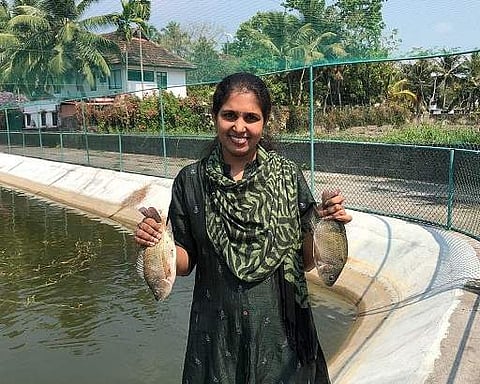

After a lifetime of academic milestones, Dr Sreeja Lakshmi has just embarked on her latest journey. She has been awarded an international fellowship grant, funded by the International Veterinary Vaccinology Network and the International Development Research Centre based in Canada, for a project titled ‘Development of a Nanoparticle Tilapia Lake Virus (TiLV) Vaccine for Tilapia Aquaculture in India’.
Sreeja who hails from Anjeri, Malappuram, pursued her Master's in Biochemistry from the Department of Life Sciences from the University of Calicut, following which she earned a PhD from the University of Regensburg, Germany. Later, she completed her post-doctoral research at the Institute of Tropical Medicine of the University of Tübingen, Germany. Here, she spearheaded an international research project on the village of Kodinhi in Malappuram where the largest number of multiple births have been recorded.
“After completing my master's, I worked as a faculty member in institutions under Calicut University before I did my PhD,” explains Sreeja. “After that, I took a small break to take care of my first child. During this time, I was writing and researching about subjects related to natural bioactive compounds in treatment strategies. These are compounds that are derived from plants and marine resources which can help us find naturopathic treatments for diseases. These papers got published internationally.”
Soon after this, she got selected for the Women Scientists Fellowship offered by the Department of Health Research of the Government of India from 2017 to 2020 for research on Marine Bioactive Compounds. And this year, she became the Indian postdoctoral researcher who won the international grant along with women from Brazil, Kenya, Egypt and South Africa. “The award is related to the development of a vaccine against tilapia lake virus to protect tilapia aquaculture,” says the 39-year-old. “The tilapia is an important fish - it is a major protein source as well as an income generator for fish farmers. They are affordable because they can be cultivated in small, ordinary tanks. If such a disease spreads, it could lead to a major loss in the fishing community.“
She continues, “With this fellowship, we plan to develop a nanoparticle-coupled vaccine that is cost-effective, easily administrable by the farmers themselves and that will greatly benefit the tilapia industry in India.” Under the guidance of Dr Kim Thompson and Dr David Smith from the Moredun Research Institute in Scotland, her co-mentor will continue to be Assistant Professor at the Kerala University of Fisheries and Ocean Studies and her husband, Dr EP Preetham. The project which offers an initial grant of £46,000 for 10 months will require Sreeja to spend three months in the UK.
When an international grant of this scale is awarded, it benefits the host research organisation as well by offering new gateways for research scholars. Sreeja says, “My being a fellow in this project increases the chances for international collaboration. Students and other collaborators will visit here to understand more about the issue being researched. They will study what we are doing here. They will also commence potential sources of funding. So, I can have personal development while it also benefits the institution and fellow students.”
